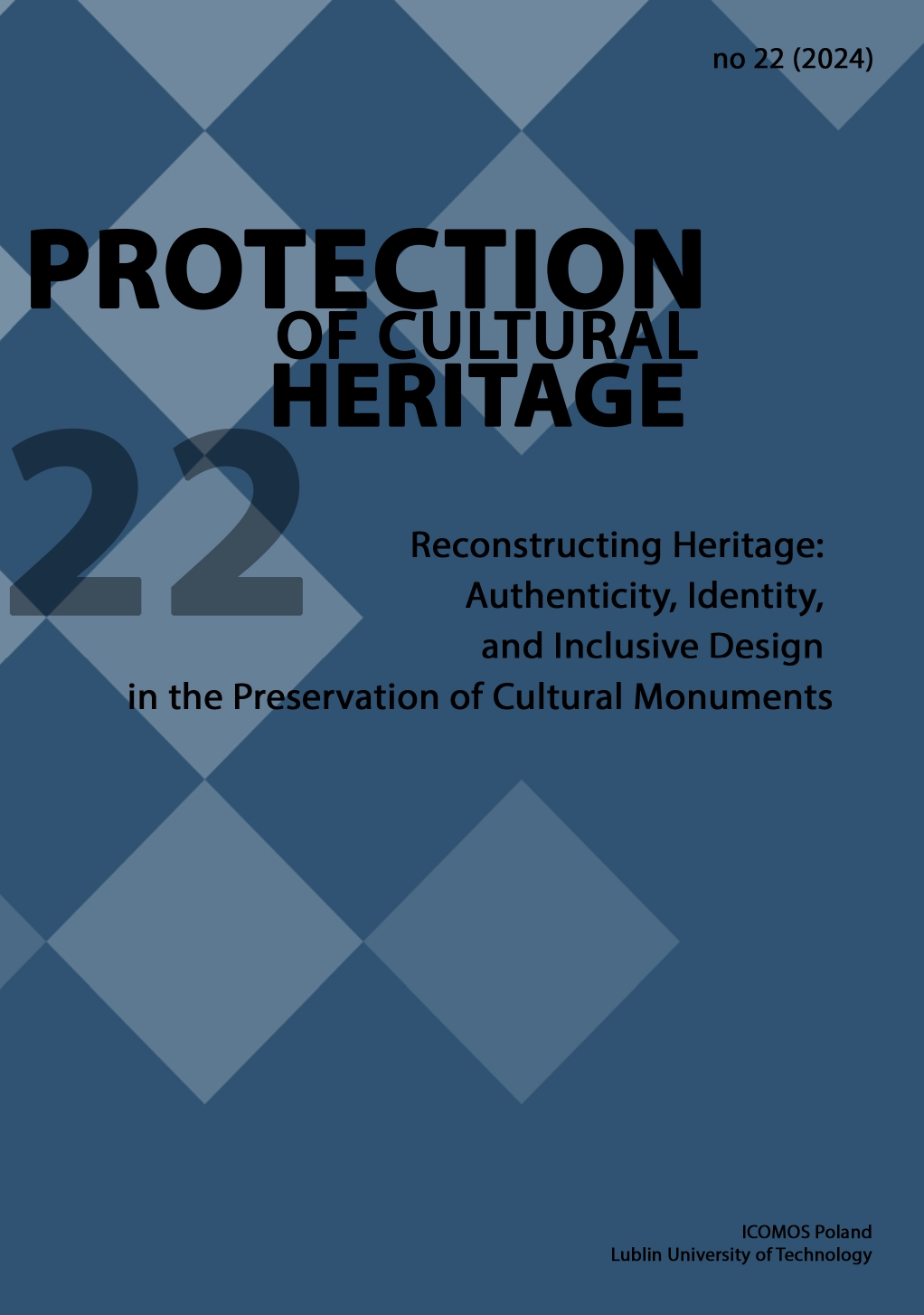Heritage Authenticity as a Source of Personal and Collective Identity
Article Sidebar
Issue No. 22 (2024)
-
Reconstruction of destroyed architectural monuments in Ukraine:
Between historical authenticity and modern needs of the urban environmentOlesya Chagovets, Olena Zhukova1-32 -
Heritage Authenticity as a Source of Personal and Collective Identity
Jelka Pirkovič33-47
-
The ‘open’ Venice Charter
Learning from the Multiple Interpretations and Translations of the Charter’s Article 9Claudine Houbart, Stéphane Dawans49-60 -
Reflecting on the Venice Charter: Constructing an Accessible Environment for the Preservation of Taiwan’s Cultural Heritage
Chih-Yuan Chang61-75
-
Authenticity: A very Greek word in a complex European setting
Dimitrios Zygomalas77-92
-
The heritage of light and shade in Cairo
The missing principle for conservation in Islamic historic citiesHossam Mahdy93-108 -
Built Heritage Meets Inclusive Design
Identifying Challenges And Strategies Through A Multiple Case Study EnquiryLene Van de Bemdt, Ann Heylighen, Negin Eisazadeh109-127
Main Article Content
DOI
Authors
Abstract
The pursuit of authenticity has been driving heritage discourse, stemming from the early efforts of heritage theory. My contribution provides a comprehensive view of heritage authenticity from an existential standpoint. I draw upon Martin Heidegger's Dwelling, Building and Thinking, which offers contrasting perspectives on human existence within time and place: caring and cultivating versus creating and destroying. From this contrast, it becomes evident that heritage embodies authenticity when it reinforces caring and cultivating shared values. With this, authentic caring allows heritage to endure and contributes to constructive development and adaptive changes while respecting the spirit of place.
Viewing heritage authenticity through psychological and philosophical lenses emphasises its significance in personal and collective identity formation. Understanding “the other” is essential in shaping our identities. This paradox is also evident in heritage and can be addressed by fostering a more inclusive approach that embraces and integrates the heritage of others. Such an approach challenges the conventional understanding of the interplay between heritage authenticity and identity.
Authenticity and identity depend on heritage values, memories, and knowledge. Through this relationship, a society becomes visible to itself and others. Building on Martin Heidegger and Alessandro Ferrara’s understanding, the authentic identity expressed in heritage provides valuable insights into a society's identification process.
Keywords:
References
Audi, R. (2011). Epistemology: A Contemporary Introduction to the Theory of Knowledge, third Kindle ed. New York: Routledge.
Bozeman, B. (2007). Public Values and Public Interest: Economic Individualism. Washington DC: Georgetown University Press. DOI: https://doi.org/10.1353/book13027
Choay, F. (1992). L’allégorie du patrimoine. Paris: Éditions du Seuil (English translation 2000, The Invention of the Historical Monument. Cambridge UK, Cambridge University Press).
Council of Europe (2005). Framework Convention on the Value of Cultural Heritage for the Society. https://rm.coe.int/1680083746.
Ferrara, A. (1998) Reflective Authenticity: Rethinking the Project of Modernity. London: Routledge.
Hartman, R. S. (1967) The Structure of Value: Foundations of Scientific Axiology, Carbondale, Oregon: Southern Illinois Press.
Heidegger, M. (1962). Being and Time. Cambridge, USA, Oxford, UK: Blackwell.
Heidegger, M. (1997). Building, Dwelling, Thinking. In: Leach, N. (ed.) Rethinking Architecture: A Reader in Cultural Theory (94-104). London: Routledge.
Heynen, H. (2006). Questioning Authenticity. National Identities, 8(3), 287–300. https://doi.org/10.1080/14608940600842607. DOI: https://doi.org/10.1080/14608940600842607
ICOMOS (2008). Quebec Declaration on the Preservation of the Spirit of Place. https://www.icomos.org/images/DOCUMENTS/Charters/GA16_Quebec_Declaration_Final_EN.pdf.
Jones, S. (2017). Wrestling with the Social Value of Heritage: Problems, dilemmas and opportunities. Journal of Community Archaeology & Heritage 4(1), 21–37. DOI: https://doi.org/10.1080/20518196.2016.1193996
Kristinsson, S. (2007). Authenticity, identity, and fidelity to self. In: Rønnow-Rasmussen, T. et al. (eds.) Hommage à Wlodek: Philosophical Papers Dedicated to Wlodek Rabinowicz (1-33). Lund: Department of Philosophy, Lund University, https://www.fil.lu.se/hommageawlodek/site/papper/KristinssonSigurdur.pdf.
Kolar, T., Kos Koklič, M & Žabkar, V. (2019) Managing sustainable consumption of cultural heritage: the key role of existential authenticity. In: Castelo, A. et al. (eds.) Cultural heritage. (71–84). London, New York: Routledge. DOI: https://doi.org/10.4324/9781315107264-6
Logan, W. S. (2007). Closing Pandora’s Box: Human Rights Conundrums in Cultural Heritage Protection. In: H. Silverman & D.F. Ruggles (eds.) Cultural Heritage and Human Rights. (33–52). New York: Springer. DOI: https://doi.org/10.1007/978-0-387-71313-7_2
Munoz Vinas, S. (2005). Contemporary Theory of Conservation. Amsterdam (etc.): Elsevier.
Munoz Vinas, S. (2009). Beyond Authenticity. Art Conservation and Authenticities: Material, Concept, Context (33-38): London: Archetype.
Munoz Vinas, S. (2023). A Theory of Cultural Heritage: Beyond the Intangible. Kindle ed., London, New York: Routledge. DOI: https://doi.org/10.4324/9781003288121
Papmehl-Dufay, L. (2020). Heritage value from below: A local community perspective on conservation, preservation and authenticity in SE Sweden. Cadernos do Lepaarq 17(34), 58-73. DOI: https://doi.org/10.15210/lepaarq.v17i34.19405
Pirkovič, J. (2023a), Model of heritage interpretation tailored to public co-participation. Ars & Humanitas 17(1), 251-270, https://journals.unilj.si/arshumanitas/article/view/16008. DOI: https://doi.org/10.4312/ars.17.1.251-270
Pirkovič, J. (2023b), Does archaeology deliver evidence about the past or co-create contemporary values? Ars & Humanitas 17(2), 59-77, https://journals.uni-lj.si/arshumanitas/article/view/18165/15362. DOI: https://doi.org/10.4312/ars.17.2.59-77
Ryan, R. M., & Deci, E. L. (2019). Brick by brick: The origins, development, and future of self-determination theory. In: Elliot, A. J. (ed.), Advances in Motivation Science (111–156). Amsterdam (et al.): Elsevier Academic Press. DOI: https://doi.org/10.1016/bs.adms.2019.01.001
Silverman, H. (2008). Embodied Heritage, Identity Politics, and Tourism. Anthropology and Humanism, 30, 141–155. DOI: https://doi.org/10.1525/anhu.2005.30.2.141
Smith, L. (2006). Uses of Heritage. London, New York: Routledge. DOI: https://doi.org/10.4324/9780203602263
Stovel, H. (2007). Effective use of authenticity and integrity as world heritage qualifying conditions. City & Time 2 (3), 21-36.
Taminiaux, J., & Stevens, J. (1977). Heidegger and Husserl’s “Logical Investigations”: In remembrance of Heidegger’s last seminar (Zähringen, 1973). Research in Phenomenology, 7, 58–83. DOI: https://doi.org/10.1163/156916477X00068
Taylor, C. (1991). The Ethics of Authenticity. Cambridge, Mass., London: Harvard University Press.
The Nara Document on Authenticity. Drafted in Nara, Japan, with UNESCO, ICCROM and ICOMOS (1994), https://www.icomos.org/en/charters-and-texts/179-articles-en-francais/ressources/charters-and-standards/386-the-nara-document-on-authenticity-1994.
UNESCO (2003). Convention for the Safeguarding of the Intangible Cultural Heritage. Paris.
Varga, S. & Guignon, C. (2023). Authenticity In: The Stanford Encyclopaedia of Philosophy, https://plato.stanford.edu/archives/sum2023/entries/authenticity/.
Wang, N. (1999). Rethinking Authenticity in Tourism Experience. Annals of Tourism Research, 26(2), 349-370. DOI: https://doi.org/10.1016/S0160-7383(98)00103-0
Żmudzinska-Nowak, M. & Wałek, M. (2024). Losing Genius Loci in Cultural Heritage Sites – Landscape of Defensive Castle Open-Air Museums of the Jurassic Belt, Poland. Muzeológia a kultúrne dedičstvo, 2024,12(3), 43-62. DOI: https://doi.org/10.46284/mkd.2024.12.3.4
Article Details
Abstract views: 388







